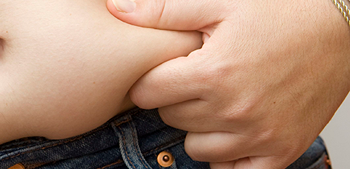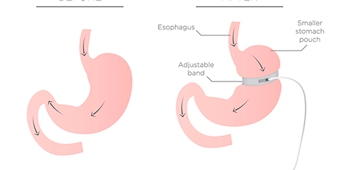
If you’re struggling with obesity or any other weight related issues, bariatric surgery can be an option for you; whether it’s the gastric bypass, the abdominoplasty, or the gastric sleeve, your doctor will help you determine which procedure is right for you. Although each surgery has different techniques that can help patients achieve their weight loss goals, the preoperative and postoperative processes can present similarities, both in doctor recommendations and common struggles, such as overeating after you finish your recovery period.
We’ve already covered that overeating after a gastric bypass is possible and we explored what causes can lead to it, the consequences it can bring, and how to prevent it. At LIMARP®, Dr. Liza María Pompa González and our team of multidisciplinary doctors want you to have all the information possible on what to expect before and after your surgical procedure. We’re also with you on every step of the way to ensure that your recovery process goes over smoothly and with no complications.
This article is directed toward bariatric patients that are eligible for the gastric sleeve. We’ll go over several topics, such as what makes you a candidate for this surgery and the preoperative recommendations, but our main focus is on the postoperative process and the struggles you may confront during it. One of them is the possibility of overeating after the gastric sleeve, which is entirely possible and also avoidable.
Are You Eligible for the Gastric Sleeve?
The gastric sleeve is one of the most effective surgeries to help people lose weight and to help them maintain the extra pounds off. However, not everyone is a candidate for this type of surgery and bariatric patients must meet some criteria to become eligible for the gastric sleeve. This surgery is usually indicated for morbidly obese adults with a BMI of 40 or higher, and for patients who also suffer from other weight-related conditions, such as: diabetes, sleep apnea, joint pain, and hypertension.
The patient should also be able to handle physical stress because the invasive nature of the gastric sleeve can lead to complications and make the surgery very risky. Your doctor may recommend that you change your diet and take up a physical activity regime to prepare your body for surgery, and they may also refer you to a mental health professional to help you adapt to your new lifestyle.
At LIMARP®, you will meet our bariatric psychologist nutritionist so that they can prepare you for the changes you will experience after the gastric sleeve. They will give you a set of instructions that includes following a strict diet for ten days before your surgery; they will also indicate not to eat or drink anything on the night before your procedure, so that you have an empty stomach during the surgery.
The Gastric Sleeve
The gastric sleeve is a restrictive procedure that consists in reducing the size of the stomach by removing approximately 75% to 80% of it from the body, leaving only a small part that resembles a sleeve. By reducing the size of the stomach, the gastric sleeve only allows the ingestion of a certain amount of food, allowing the patient to reach or maintain a healthy weight. This procedure does not interfere with the absorption of nutrients, though, because it does not involve any alteration to the digestive process, as it leaves the intestines intact.
The amount of weight loss to expect after a gastric sleeve procedure depends on many factors, such as the patient’s BMI before surgery, their commitment to maintain healthy habits, such as a well-balanced diet and physical activity, and the time that has passed after the surgery. The patient can expect major changes in weight loss as soon as six months and as long as three years.
For more information on what to expect during and after the gastric sleeve procedure, we invite you to read this article that covers all the necessary information you need if you’re considering getting this surgery or contact us for a one-on-one consultation with one of our doctors.
Common Postoperative Complications
As is the case with every surgery, the gastric sleeve can also come with complications in the postoperative recovery process. Some of them include: staple line leaks, bleeding, strictures, digestion issues, and sagging skin. These complications are considered rare and there are several ways to treat them in case they should appear. However, a complication that can lead to more uncomfortable symptoms is overeating after the gastric bypass.
Eating a lot is not recommended after this surgery and doing so would mean breaking the diet your doctor recommended to maintain a healthy weight. Overeating can take form in irregular snacking behaviors or binging during meals despite being full. Because the surgery removes a large portion of your stomach, overeating can result in significant weight gain or plateaus, as well as abdominal pain, cramps, frequent indigestion, and heartburn.
Overeating after gastric sleeve surgery can also result in the following symptoms:
- Vomiting and Diarrhea: When the stomach receives more food than it can hold, it’s natural for the body to release the contents through vomiting or diarrhea. Overeating can also affect the body’s digestion.
- Dumping Syndrome: This can happen when the food you consume, usually undigested, passes too quickly through the intestine, and it’s usually a reaction that the stomach has when it comes to overeating. Some symptoms may include increased sweating, diarrhea, dizziness, and nausea. However, the most concerning side effect is the sudden drop in blood sugar; if you happen to experience this, seek urgent help immediately.
- Stretching of the Stomach: The stomach stretching to a larger size is the most serious consequence of overeating after gastric sleeve surgery. Repeatedly eating large meals will undo the progress surgery allowed you to make and you’ll regain the weight you lost due to your stomach stretching.
People can have a complicated relationship with food and overeating can become a type of coping mechanism to deal with stress or sadness, or it can simply be a force of habit. It’s important that bariatric surgery candidates seek professional counseling before and after getting the gastric sleeve in case they suffer from disordered eating habits.
What Can Be Done To Prevent Overeating?
Bariatric patients that become eligible for the gastric sleeve are given a detailed explanation of the process they will go through before and after the surgery, which includes a dietary plan that will evolve as your body recovers. Our medical team at LIMARP® works alongside you to create a personalized plan that’s right for you. While each patient’s relationship with food is different, here are some tips that can help you manage or prevent overeating:
- Eat Mindfully
When people eat quickly, it’s common that they don’t realize that they’re full until they’ve overeaten. If you chew slowly and really savor your meals, you’ll be able to tell when you’re really full and be conscious of the amount of food you’ve eaten. This is a good technique to follow, regardless if you’re recovering from the gastric sleeve or not.
- Identify When You’re Full
Everyone has grown accustomed to wanting to finish everything that’s on their plate, but you really don’t have to if you’re already full. Forcing yourself to finish every single thing on your plate can lead to overeating and it’s important to listen to your body when it’s already full. Get it boxed up or use a sealable container so you can save it for later. Learning how to identify your body’s cues when it’s full takes time, so it’s important to highlight that if you’re following a strict diet, this method may not be suitable for you. Contact your doctor or a trained professional if you’re having trouble maintaining a healthy diet or keeping yourself from overeating.
- Talk to A Mental Health Professional
Since our emotional and psychological relationship to food is complicated, it’s important that you speak with a therapist about these issues and prevent them from developing into more serious eating disorders. They can go over your thought process regarding food and help you develop better habits and behaviors when it comes to eating and your coping strategies. Our team at LIMARP® counts with licensed professionals that can help you in your journey of developing a healthier relationship with food and overall body image.
- Keep a Close Eye on Your Portions
Portion control can make a major difference when it comes to how much you consume, but it must be done responsibly and by following a meal plan approved by a licensed dietitian. This technique can help prevent overeating, but it can also lead you to undereating; if you’re recovering from a gastric sleeve, it’s imperative that you follow a structured diet so that you can ingest the necessary nutrients. There are several tools that can help you eat the amount of food you really need, such as measuring cups, scales, and small plates.
Contact Us to Learn More
For more information about the consequences of overeating after a gastric sleeve, schedule an appointment with one of our doctors. We can help determine the right treatment for you. Contact us online anytime or give us a call at (619) 373-0229.


